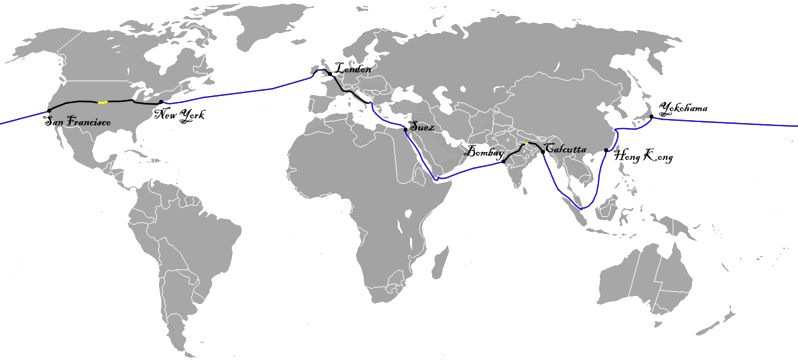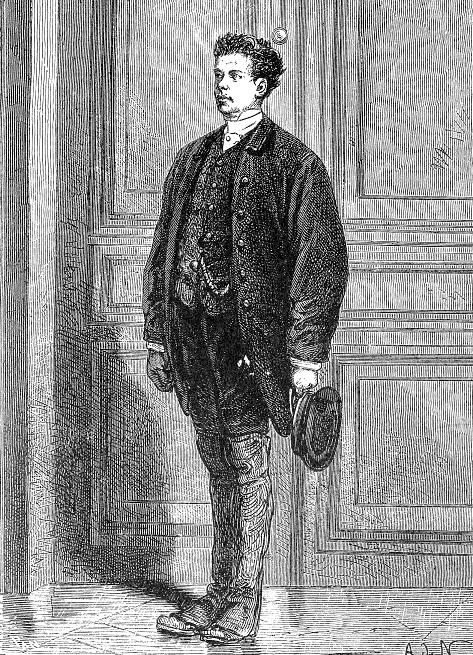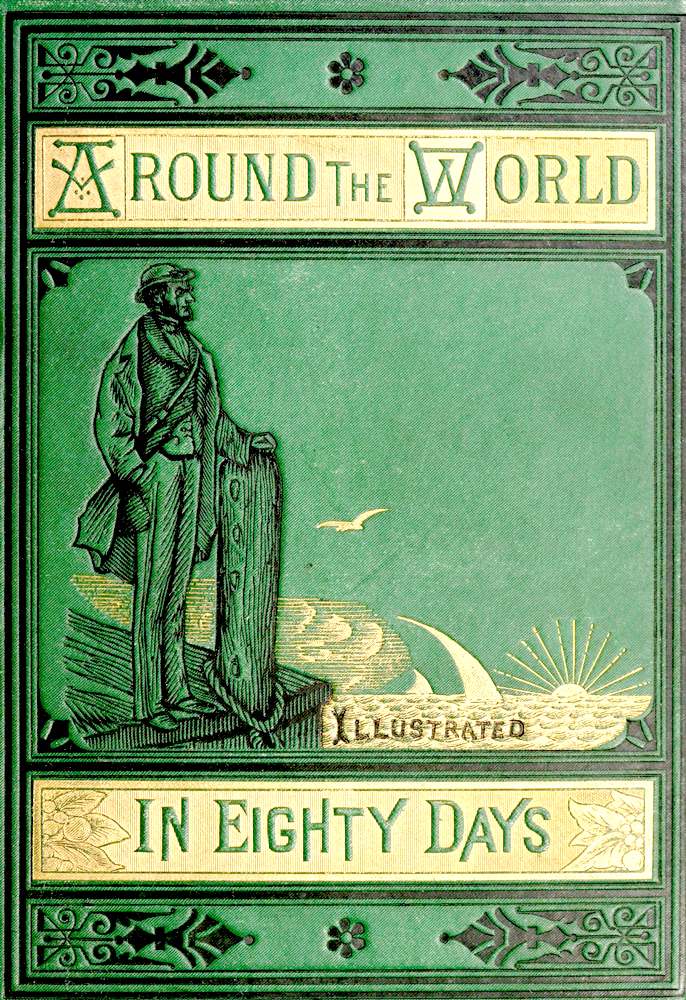|

Map
of the route taken by Phileas Fogg, starting in London, then proceeding
east to Suez, Bombay, Calcutta, Hong Kong , Yokohama, San Francisco, New
York, and across the Atlantic
ocean to Ireland, then Liverpool England, and back to London. The route
planner below is for a circumnavigation on water in under 80 days, using
hydrogen, as per the author's prediction in The Mysterious Island. It
would be a major achievement if this was arranged to honor the 150th
anniversary of his publication.
Jean Passepartout is the French
valet of Phileas Fogg, in 1872 Jules Verne novel
Around the World in Eighty
Days.
Passepartout is a fictional character in Jules Verne's novel
published in 1873. He is the French valet of the novel's English main character, Phileas Fogg. His surname translates literally to "goes everywhere", but this is an idiom for 'skeleton key' in French. It is also a play on the English word passport, the French equivalent passeport, and the French word partout (everywhere).
At the beginning of the novel, Passepartout is hired by Phileas Fogg after Fogg's previous valet failed to meet his exacting standards on 2 October 1872 at twenty eight minutes past eight. Passepartout, who has lived an irregular and well-travelled life, is looking forward to a restful employment, as Fogg is known for his regular habits which never take him further afield than the
Reform
Club.
Ironically, on Passepartout's first day at work, Fogg makes a bet with his friends at the Club that he can circumnavigate the world within 80 days and Passepartout is obliged to accompany him. In addition to the wager, the valet has an additional incentive to complete the journey quickly: he left a gaslight burning in his room and the resulting expense of wasted gas will be docked from his salary.
In the journey, Passepartout plays a critical role in Fogg's adventures, such as rescuing a young woman named Aouda from a forced sati and becoming a friend of
Inspector Fix, a police detective who suspects Fogg of robbing a bank. Passepartout learns of Fix's suspicions, but keeps them to himself as he believes Fogg already has enough to worry about concerning his wager, and comes to suspect Fogg may possibly have committed the crime considering the extraordinary spending his master does through the trip's more desperate moments. Due to his silence, however, Fogg and Fix never have a chance to discuss the case in neutral territory, and Fix arrests Fogg as soon as they return to England. This critically delays Fogg before he is exonerated and the company arrives in London, seemingly too late and leaving Passepartout in almost suicidal despair at his foolishness.
The next day at home, Princess
Aouda proposes to Fogg to help him in his hard life ahead. While searching for a minister to marry the couple, Passepartout discovers that the date is one day earlier than he thought, due to the party having traveled east across the International Date Line. Once Fogg learns of the error, he dashes to the Reform Club and arrives just in time to win the bet.
Fogg marries Aouda, with Passepartout giving away the bride, and divides the net proceeds from the journey between Passepartout and Fix
— but not without deducting the cost of the gaslight use from Passepartout's share.
The character of Passepartout serves several purposes in the narrative—as a point-of-view character for Verne's French readers, and as comic relief, both in his reactions to the strange places and events he encounters, and in a tendency to get trapped, abducted, or, on at least one occasion, left behind.

Jean
Passepartout does not really understand the intentions of his employer,
Phileas Fogg, putting the whole venture in jeopardy at one point and
feeding Detective Fix information that is damaging to the Wager, that
could cost his master dearly. But, the French manservant comes back to
help Fogg, as does Scotland' Yard's Fix, in the final stages of the
geographical extravaganza.
PLOT
- AROUND
THE WORLD IN EIGHTY DAYS
The story starts in London on October 2, 1872. Phileas Fogg is a wealthy, solitary, unmarried gentleman with regular habits. The source of his wealth is not known and he lives modestly. He fires his former valet, James Forster, for bringing him shaving
water two degrees too cold. He hires as a replacement
Passepartout, a Frenchman of around 30 years of age.
Later that day in the Reform Club, he gets involved in an argument over an article in
The Daily
Telegraph, stating that with the opening of a new railway section in India, it is now possible to travel around the world in 80 days.
Fogg accepts a wager for £20,000 from his fellow club members, which he will receive if he makes it around the world in 80 days. Accompanied by his manservant
Passepartout, he leaves London by train at 8.45 p.m. on October 2, 1872, and thus is due back at the Reform Club at the same time 80 days later, on December 21.

Jules
Verne is known as the Father of Science Fiction
Where
Jules Verne's suggested that it might be possible to travel Around The
World In 80 Days, we would like to extend that ethos to include
traveling in a Zero
Emission yacht (ZEWT or ZEV) driven by electric
hydro-jets? With the advent of solar power and liquid
hydrogen, it is a distinct possibility - on a scale of the wager
that the legendary Philleas Fogg entered into at the Reform Club in
1872.
|



